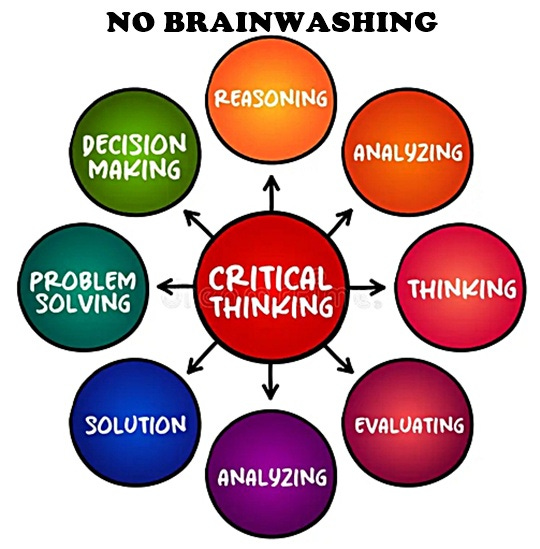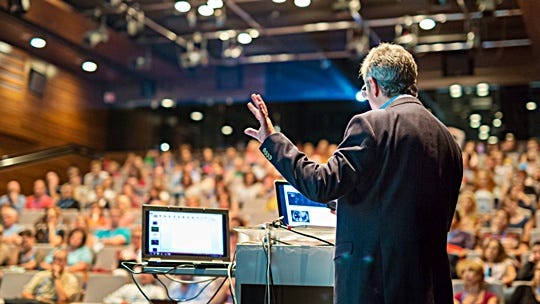Intro to ‘Restoring the Mind of the Republic’
Intro by John R. Houk, Blog Editor
Intro © September 10, 2025
In my Baby Boomer Generation (I’m approaching 69 in November) a College/University education was promoted as the pathway to a successful life. After the protest era (largely Vietnam War protesting) of the late ‘60s and early ‘70s, college education transformed from critical thinking into Leftist indoctrination. Today’s divided America is experiencing the fruit of that deceptive transformation.
I ran into an interesting essay at TomKlingenstein.com that addresses a reform of College/University indoctrination entitled, “Restoring the Mind of the Republic”. The essay is by Daniel J. Mahoney. If you have kids in High School, especially kids about to graduate, YOU should read this post if YOUR kids are planning a College/University journey. Consider finding an Academic Program focused more on teaching to think for oneself (critical thinking) and less on Leftist Transformation Brainwashing.
JRH 9/10/25
Always Free to Read yet READER SUPPORTED!
PLEASE! I need more Patriots to step up. I need Readers to chip in $5 - $10 - $25 - $50 - $100 (PAYPAL or CARD - one-time or recurring). YOUR generosity is APPRECIATED. PLEASE GIVE to Help me be a voice for Liberty:
Please Support John’s Newsletter
Big Tech Censorship is pervasive – Share voluminously on all social media platforms!
Our Senior Citizen Family Supplements our income by offering healthy coffee products. BETTER YOUR HEALTH with healthy & good tasting COFFEE and enjoy some weight management supplements. BUY Happy Coffee & Weight Loss Supplements at the Diana Wellness Store:
*****************************
Restoring the Mind of the Republic
College Course (TomKlingenstein.com Photo) Matej Kastelic/Shutterstock
September 9, 2025
Editor's Note
The universities that once shaped citizens capable of self-rule now produce ideologues incapable of self-reflection. In place of liberal education, they offer a catechism of grievance and identity. It’s a system designed not to enlarge the mind but to narrow it.
Academic and essayist Daniel J. Mahoney describes an emerging alternative: schools of civic thought that recover what our elite campuses have abandoned. They resist the destructive Left’s groupthink without falling into a mirror-image dogmatism. They turn students not toward slogans but toward the great questions of politics, philosophy, and human purpose. In doing so, they remind us that education, rightly understood, is the foundation of a free people.
In today’s universities, identity has replaced intellect. The great tradition of liberal learning — “the best that has been thought and said” — is cast aside in favor of a cult of “settler colonialism.” The result is not wisdom but indoctrination: graduates schooled less in judgment than in a reflexive disdain for the West.
Over the past two decades, we have witnessed an Orwellian reversal of the first order. The idol of “diversity” has produced an almost uniformity of thought, enforced by clichés that smother debate before it begins. Our leading universities and most prestigious liberal arts colleges now do little to foster the independence of spirit, the self-respect, and the openness to enduring wisdom that allow the life of the mind to flourish.
These supposed centers of inquiry refuse to even entertain a balanced appreciation of the West — of both its flaws and its remarkable, and rare, capacity for self-correction. Too often, graduates of even our finest universities leave with little knowledge of the civilization that formed them, coupled with open contempt for the freest and most self-critical societies in human history. They emerge, instead, inclined toward the most unreasonable utopian demands.
Thankfully, when it comes to higher education, not all news is bad news. There is now pushback in the upper echelons of government: the Trump administration is leveling the playing field, one that’s long been askew.
Trump’s stalwart refusal to subsidize DEI, tolerate the subversion of women’s sports in the name of “trans rights,” or allow heedless antisemitism at elite universities is changing the rules of a game long played against our republic’s interest. The public mind is changing, too, at a parallel pace. More than a few parents have caught on to the fact that most college campuses do their best to stifle the most valuable form of pluralism: intellectual diversity.
But the days of the Left’s command on civic education are numbered. Thanks to the rise of what are now commonly called “schools of civic thought” in a host of red and purple states, there’s hope for the restoration of authentic liberal education for our children.
The first of these state-chartered programs, the School for Civic and Economic Thought and Leadership at Arizona State University (SCETL), was established in 2016 with strong backing from a Republican governor and legislature — and, predictably, with resistance from the Democratic opposition.
As public opinion on education shifted in the President Trump’s favor, the Left gradually softened its stance, backing appropriations for a program that no longer seemed so contentious. By 2023, Democrats even lent their support to the creation of the Institute of American Civics at the University of Tennessee.
SCETL, like any new institution, experienced its share of growing pains alongside notable successes. Nine years on, under the leadership of Richard Avramenko, it now boasts a rigorous undergraduate major and minor, offers a robust graduate program, and hosts conferences and lectures that deepen the study of citizenship and statesmanship in both American and global contexts.
In its courses, political philosophy and the study of statecraft are seamlessly interwoven. The pursuit of wisdom is grounded in disciplinary learning, yet refuses to be confined by it. SCETL, like the civic thought programs it inspired, rests on a rejection of rejection itself — of the easy wokeness and political correctness that erode liberal education, constitutional self-government, and our civilizational inheritance.
Among the array of SCETL scholars both young and aged, you won’t find any sympathy for totalitarian political religions, facile moral nihilism and “transgression,” nor any contempt for America’s founding principles.
For this academic, it’s a breath of fresh air; when I joined the school’s ranks for a semester engagement, I did so with pride.
But SCETL’s wholesale rejection of the woke Left’s typical chokehold isn’t rooted in some right-leaning counter-ideology that’s equally fanatical or doctrinaire. The school simply refuses to play a role in the culture war that rages outside the walls of campus.
As the distinguished political theorist Harvey C. Mansfield wrote in SCETL’s mission statement, the large questions of human and civic life need “open and vigorous debate” on college campuses. He has created a blueprint, here, that other schools would do well to follow. After all, the university should have no place for what George Orwell once called the “smelly little orthodoxies” beloved by the fashionable intellectuals.
On the other hand, universities don’t need the Right to pursue a counter-politicization; they require, instead, renewed attention to the enduring civic and human questions of knowledge, life, virtue, and justice.
As Mansfield points out, these Socratic questions need to be pursued in two distinct but complementary ways: an approach that looks “beyond the time and borders of our present society” (think Plato, Homer, Dante, Shakespeare, or even Marx and Nietzsche), and one that delves deeply into our own civic tradition.
Only with such thoughtful engagement, can we know “whether they need to be reformed or reasserted.” The Founding Fathers, here, ought to have pride of place — as should political thinkers from Lincoln, Woodrow Wilson, Abigail Adams, the two Roosevelts, Mercy Warren and Martin Luther King.
No serious civic thought program can neglect “the two greatest books on America, The Federalist and Alexis de Tocqueville’s Democracy in America.” [Blog Editor Bold Text Emphasis] The thoughtful integration of great books and great speeches, political philosophy, political history, and political economy (just as Mansfield recommends) aims at something higher than technical expertise or even civic competence.
In Mansfield’s words, SCETL, and the “civic thought” approach at its best, “looks outward to humanity and inward to America.” It “tries to be both proud of genuine greatness” — the dignity of man — “and humble about human imperfection.” It eschews both “visionary expectations” for politics and “unmanly contempt” for the effort of human beings to govern themselves in freedom and virtue, as Leo Strauss once put it.
Fortune has smiled on America: Some version or another of the SCETL approach has spread far and wide.
Ohio, now, has five such institutes either in formation or operation. The Buckeye State’s flagship effort, the Chase Program for Civics, Culture, and Society under the direction of Lee Strang, promises great things for American culture. Meanwhile, at the University of Texas – Austin, the School for Civic Leadership is developing a first-rate program rooted in the study of first principles. At the University of Florida, the Hamilton School of Classical and Civic Education is shedding light on the intellectual history of the West, attracting distinguished scholars such as Allen Guelzo and James Hankins, co-authors of the forthcoming two-volume history of Western civilization, The Golden Thread.
New civic thought initiatives, each with their own distinct focus, have also taken shape in North Carolina, Utah, and Tennessee — with more expected to follow.
Of course, there are unlikely to be any such initiatives in blue states any time soon. Within their entrenched intellectual circles, self-loathing and “settler colonial” ideology will continue to flourish for the foreseeable future.
But for red states, merely implementing these schools won’t bypass the risks therein. If their new programs have hope of enduring, they must do what the academic Left would not: avoid narrow partisanship and the quest for ideological purity. At the same time, they must also avoid a dangerous attempt at “fairness” which places disciplinary distinctions, modern norms, and a false sense of ideological balance above the noble mission, such as the one articulated by Mansfield.
This is certainly one tricky line to tread, but it’s crucial educational leaders try.
There is a method to this work. As American Enterprise Institute fellows Benjamin Storey and Jenna Silber Storey have noted, our intellectual forebears left us blueprints in the dialogues of Socrates, the counsel of Catherine of Siena, and the oratory of Cicero and Frederick Douglass. Unlike the academic mainstream, schools of civic thought must prize dialogue and the pursuit of truth, resisting both the lure of ideological zealotry and the temptations of relativistic “pluralism.”
I’d be remiss not to mention private institutions such as Hillsdale College (where I now serve as a Senior Visiting Fellow) and the new University of Austin, both playing vital roles in restoring the civic and civilizational dimensions of liberal education. The University of Austin seeks to bridge “the two cultures,” humanistic and scientific, while resisting the tyranny of political correctness.
And Hillsdale, with its graduate programs in Michigan and Washington, D.C., long paved the way for civic thought by uniting the study of the Founding, Great Books, politics, literature, and statecraft, while also confronting the ideologies that undermine republican self-government.
These efforts complement one another, provided they remain anchored in two essentials: spirited resistance to political correctness and the pursuit of truth in dialogue with the wisdom of the past.
But for every school of this kind, the task at hand is clear yet formidable: to recover the art of truth-seeking dialogue within the ruins of a fallen education system. If they can resist both zealotry and relativism, they will have achieved something rare — a model of education worthy of free citizens. From such a restoration, the effects would ripple outward, renewing not only our universities, but also the civic life of the republic itself.
Daniel J. Mahoney is a Senior Fellow at the Claremont Institute and professor emeritus at Assumption University.
2025 Tom Klingenstein




